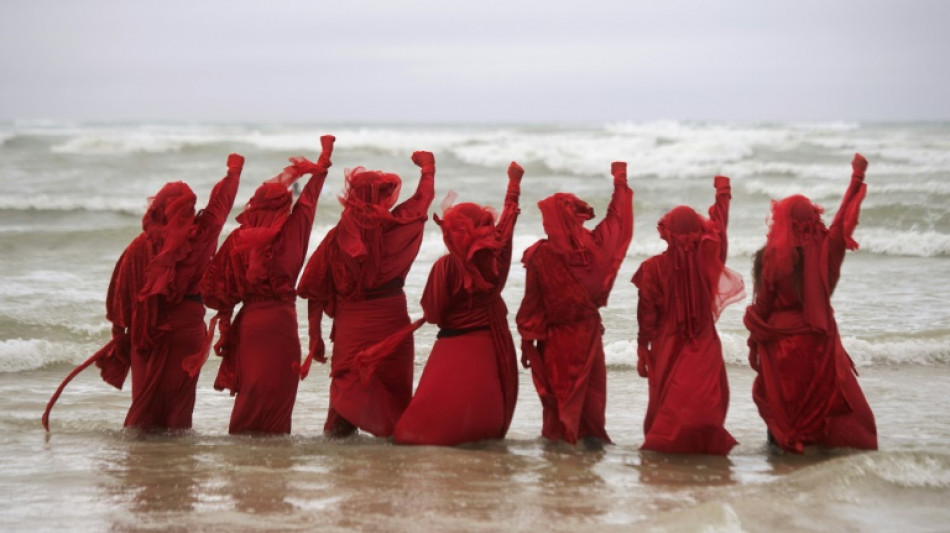
-
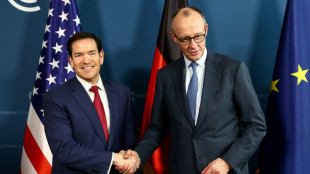 Rubio at Munich security meet to address Europeans rattled by Trump
Rubio at Munich security meet to address Europeans rattled by Trump
-
Medal-winner Sato says Malinin paid for 'toxic schedule'

-
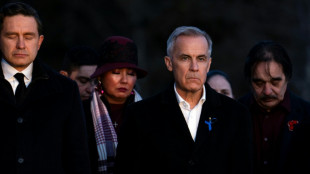 Carney offers support of united Canada to town devastated by mass shooting
Carney offers support of united Canada to town devastated by mass shooting
-
All-in on AI: what TikTok creator ByteDance did next

-
 Canada PM visits memorial for mass shooting victims as new details emerge
Canada PM visits memorial for mass shooting victims as new details emerge
-
Healthy Ohtani has Cy Young Award in sights

-
 One of Lima's top beaches to close Sunday over pollution
One of Lima's top beaches to close Sunday over pollution
-
'Nothing is impossible': Shaidorov shocks favourite Malinin to make history

-
 Malinin wilts at Olympics as Heraskevych loses ban appeal
Malinin wilts at Olympics as Heraskevych loses ban appeal
-
Bhatia joins Hisatsune in Pebble Beach lead as Fowler surges

-
 Malinin meltdown hands Shaidorov Olympic men's figure skating gold
Malinin meltdown hands Shaidorov Olympic men's figure skating gold
-
Top seed Fritz makes ATP Dallas semis with fantastic finish

-
 Patriots star receiver Diggs pleads not guilty to assault charges
Patriots star receiver Diggs pleads not guilty to assault charges
-
Havana refinery fire under control as Cuba battles fuel shortages

-
 Peru Congress to debate impeachment of interim president on Tuesday
Peru Congress to debate impeachment of interim president on Tuesday
-
Snowboard veteran James targets 2030 Games after Olympic heartbreak

-
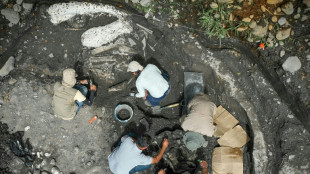 Costa Rica digs up mastodon, giant sloth bones in major archaeological find
Costa Rica digs up mastodon, giant sloth bones in major archaeological find
-
Trump says change of power in Iran would be 'best thing'

-
 Ukrainian skeleton racer Heraskevych loses appeal against Olympic ban
Ukrainian skeleton racer Heraskevych loses appeal against Olympic ban
-
Paris police shoot dead knife man at Arc de Triomphe
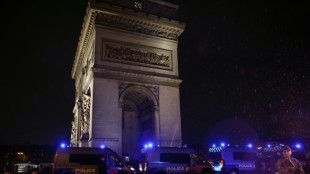
-
 Japan's Totsuka wins Olympic halfpipe thriller to deny James elusive gold
Japan's Totsuka wins Olympic halfpipe thriller to deny James elusive gold
-
Canada's PM due in mass shooting town as new details emerge

-
 Neto treble fires Chelsea's FA Cup rout of Hull
Neto treble fires Chelsea's FA Cup rout of Hull
-
Arbitrator rules NFL union 'report cards' must stay private

-
 Dortmund thump Mainz to close in on Bayern
Dortmund thump Mainz to close in on Bayern
-
WHO sets out concerns over US vaccine trial in G.Bissau

-
 Skeleton racer Weston wins Olympic gold for Britain
Skeleton racer Weston wins Olympic gold for Britain
-
Ex-CNN anchor pleads not guilty to charges from US church protest
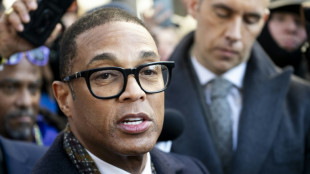
-
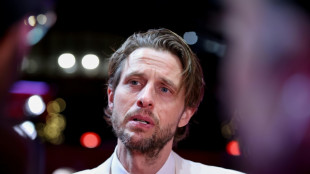 Berlin premiere for pic on jazz piano legend Bill Evans
Berlin premiere for pic on jazz piano legend Bill Evans
-
Fire at refinery in Havana as Cuba battles fuel shortages

-
 A Friday night concert in Kyiv to 'warm souls'
A Friday night concert in Kyiv to 'warm souls'
-
PSG stunned by rampant Rennes, giving Lens chance to move top

-
 Japan's Totsuka wins Olympic halfpipe thriller as James misses out on gold
Japan's Totsuka wins Olympic halfpipe thriller as James misses out on gold
-
Indian writer Roy pulls out of Berlin Film Festival over Gaza row

-
 Conflicts turning on civilians, warns Red Cross chief
Conflicts turning on civilians, warns Red Cross chief
-
Europe calls for US reset at security talks

-
 Peru leader under investigation for influence peddling
Peru leader under investigation for influence peddling
-
Rising star Mboko sets up Qatar Open final against Muchova

-
 Canada PM to mourn with grieving town, new details emerge on shooter
Canada PM to mourn with grieving town, new details emerge on shooter
-
US waives Venezuela oil sanctions as Trump says expects to visit

-
 NBA star Chris Paul retires at age 40 after 21 seasons
NBA star Chris Paul retires at age 40 after 21 seasons
-
WTO chief urges China to shift on trade surplus

-
 Vonn hoping to return to USA after fourth surgery on broken leg
Vonn hoping to return to USA after fourth surgery on broken leg
-
Trump sending second aircraft carrier to pile pressure on Iran

-
 Heraskevych loses Olympics disqualification appeal, Malinin eyes second gold
Heraskevych loses Olympics disqualification appeal, Malinin eyes second gold
-
Mercedes have 'taken a step back': Russell

-
 Madagascar cyclone death toll rises to 40, water, power still out
Madagascar cyclone death toll rises to 40, water, power still out
-
Earl says England inspired by last year's Calcutta Cup

-
 Stocks sluggish as AI disruption worries move to fore
Stocks sluggish as AI disruption worries move to fore
-
USA romp past Dutch in T20 World Cup to keep Super Eight hopes alive


'We need to rebel': climate change needs radical response says XR activist
Soup on Vincent van Gogh paintings, mashed potatoes on a Monet masterpiece: climate activists are taking increasingly daring action to grab headlines -- and it's working.
In the latest such stunt, activists from the Last Generation group splashed pea soup on Van Gogh's 1888 painting "The Sower" in Rome on Friday.
While the Extinction Rebellion (XR) was not behind the recent art attacks, it is known for disruptive street protests and flamboyant costumes.
The group's co-founder Gail Bradbrook said such bold action is needed to draw attention to the "polycrisis" that threatens to tip the world into climate catastrophe and devastating biodiversity loss.
Bradbrook said when people act together they can make a real difference.
The scientist spoke to AFP ahead of the 27th round of United Nations climate negotiations opening Sunday -- branded by Greta Thunberg as "greenwashing" amid concerns that campaigners will be blocked from attending.
The interview has been edited for length and flow.
- Climate protesters have recently thrown soup over a Van Gogh painting and mashed potato over a Monet. Do shock tactics work?
In a media-saturated environment that doesn't want to tell important stories, it's hard to get attention. So people go and do something frankly quite dangerous and daft like getting on the motorway. That's agitation, and it does get a story in the mainstream consciousness. Evidence, from, for example, research by Colin Davis at the University of Bristol, suggests people may dismiss the activists involved, but their focus on the issues increases. In other words, it works from an awareness-raising perspective.
The next bit is to really inspire people that change is possible. And the third bit is acting together to make sure that the change happens. We need to rewire our economy and upgrade our democracy.
- How much can individuals do?
There's an honour in doing what you can. We can understand that for so many miles driven in a car, there's so much carbon emitted, and therefore, so much ice will melt.
But at the same time, this is systemic and what the system wants you to do is tie yourself up in a knot. It is a very stressful system that we live in. It's not by accident that BP introduced the idea of carbon footprinting.
The whole system was founded on extraction, exploitation, especially of our family in the Global South. It needs to go.
- Why did you set up Extinction Rebellion?
It was from a sense of determination to see change happen. It was more, "well, what else do you want to do with your life?"
We chose the name because we are in the sixth mass extinction event. The polycrisis that we're in, it's a climate and ecological emergency, a health crisis and inequality crisis and so on. It has many root causes. There's an elite class of people who we need to rebel against, who are not taking sufficient action, and in some cases, taking us in the wrong direction.
Climate change weather extremes are already happening. Look at Bangladesh and Pakistan. Essentially, what the world is saying is "tough". It's disgusting.
- What do you think motivates action?
One of the first things that we did with Extinction Rebellion was to move into emergency mode messaging. You tell people the bitter and brutal truth. And then you talk about why it is like that, and therefore what can be done. And then you talk about what that person can do themselves and as part of their group, so there's a sense of agency.
It's a bit like if you had a lump somewhere on your body and you go to the doctor. At the end of the day, the grown-up in you needs to know what the risks are, what the treatment is.
The good news is, it starts with being a human being, the best side of being a human being, where we feel part of life.
People have done really incredible things in times of war, for example. Human beings are really amazing, they're really up for acting selflessly, and on behalf of the collective. It is hardwired into us.
- And what stops people?
If there is no leadership telling you there's an issue, and if you get mixed messages, then you don't act.
There have been active forces at play to stop us from wanting to do anything. We know that there were large sums of money spent on climate denial.
After climate denial -- not that it is fully done with -- what is the next phase to stop us doing anything? It is these delay stories: Technology is going to save us. It's all for consumers to sort out. Or, what about China?
They're all psychological tools to give people a story to say to themselves: "I can let this go because it's too stressful to face".
O.Salim--SF-PST

